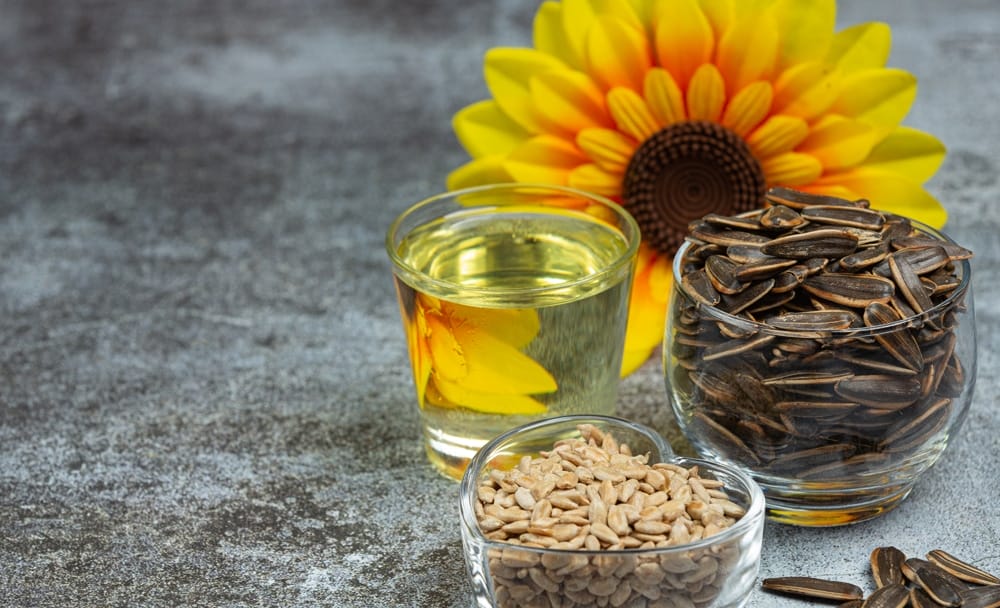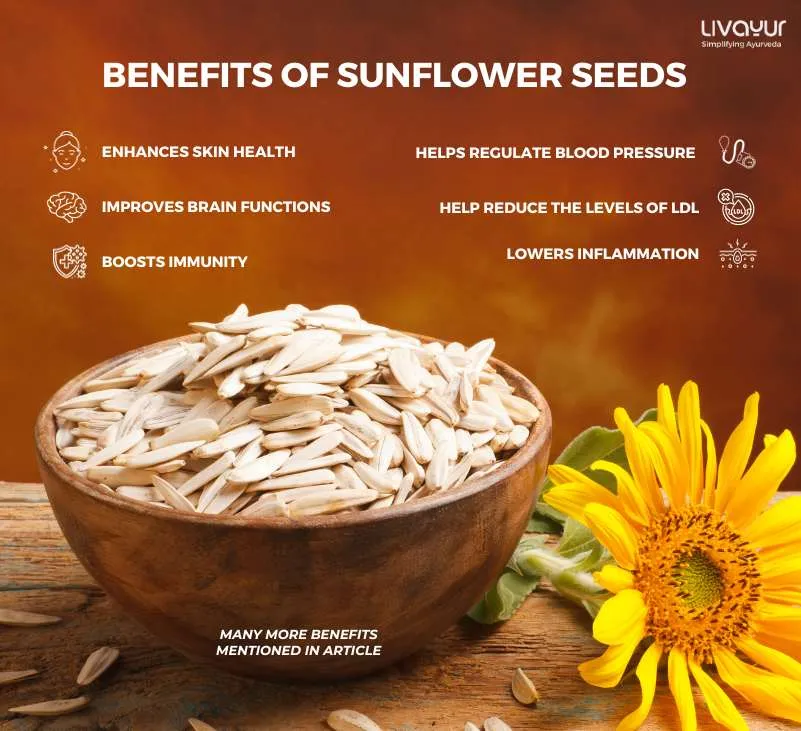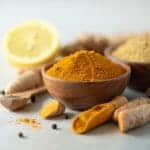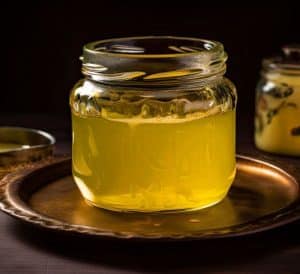
The seeds of the sunflower plant or Suryamukhi are highly popular as a healthy snack. Enriched with healthy fats, vitamins, and minerals, sunflower seeds benefits are known to treat several diseases, such as heart problems, constipation, rheumatoid arthritis, etc. According to the sunflower seeds Ayurveda perspective, they also help balance all three Doshas and increase energy in the body.
Nutritional Value of Sunflower Seeds
Sunflower seeds are rich in calories, fiber, healthy fats (mainly polyunsaturated and monounsaturated fats), and protein. They also contain a variety of essential vitamins, minerals, and plant compounds, act as antioxidants. The content of Vitamin E is quite high in sunflower seeds. [2] The protein content aids in muscle building, making them a valuable addition to a balanced diet. Here’s the nutritional value of sunflower seeds:
| Nutrient | Amount per 100g |
| Calories | 585 |
| Fiber | 8.5g |
| Total Fat | 51.5g |
| Protein | 20.77g |
| Vitamin B1 | Thiamine |
| Vitamin B2 | Riboflavin |
| Vitamin B3 | Niacin |
| Vitamin B5 | Pantothenic acid |
| Vitamin B9 | Folate |
Types of sunflower seeds
Three major sunflower seed types are commonly used:
- Linoleic sunflower seeds (most common)
- High oleic sunflower seeds
- Sunflower oil seeds (commercially used seeds chiefly for oil extraction)
Each variety has its unique levels of monounsaturated, saturated, and polyunsaturated fats.
Sunflower Seeds Benefits Backed By Ayurveda
1. Lowers Inflammation
Chronic inflammation in the body can increase the risk of many diseases. Rich in anti-inflammatory properties, sunflower seeds help reduce both internal and external inflammation and prevent chronic inflammatory diseases. [1]
2. Prevents Atherosclerosis
Sunflower seeds have potent cardioprotective properties. [1] They help boost blood flow in the arteries, clear blockages and reduce the formation of plaques in the arteries, thereby preventing atherosclerosis. In addition, they also contain polyunsaturated fatty acids that exhibit anti-atherosclerosis activity.
3. Aids in Diabetes Management
Sunflower seeds have a low glycemic index, meaning they do not cause a major spike in blood sugar levels. Furthermore, they also contain an element called chlorogenic acid, known to lower blood glucose levels in the body.
4. Controls High Cholesterol Levels
Enriched with the power of dietary fibers, linoleic acid, and oleic acid, sunflower seeds help reduce the levels of LDL or bad cholesterol in the body. In addition, they also contain vitamin B5, which helps increase HDL or good cholesterol and reduce total serum cholesterol levels. [2]
From the Ayurvedic point of view, high cholesterol is caused due to toxin accumulation and impaired digestive fire. Sunflower seeds are known to improve digestive fire and eliminate Ama or toxins from the body, thereby controlling high cholesterol levels.
5. Regulates Blood Pressure Levels
Sunflower seeds help eliminate the fat and cholesterol buildup in the blood vessels and promote the smooth flow of the blood. They are also powered with unsaturated fatty acids, especially linoleic acid, which is known to relax blood vessels and reduce high blood pressure levels. [2]
6. Treats Constipation
According to Ayurveda, constipation is caused due to an aggravated Vata Dosha in the body. Eating soaked sunflower seeds helps reduce dryness of the intestines and balance Vata Dosha, thereby treating constipation.
7. Boosts Immunity
The presence of vitamin E, zinc and selenium in sunflower seeds make it a perfect snack to enhance immune responses, fight free radicals, and protect the body against several infectious diseases.[4]
8. Relieves Rheumatoid Arthritis Symptoms
According to Ayurveda, rheumatoid arthritis (RA) or Amavata is caused due to vitiated Vata Dosha and accumulation of Ama in the joints. Sunflower seeds help balance Vata Dosha, improve digestive fire, and reduce Ama, thereby helping in the management of rheumatoid arthritis. Furthermore, the anti-inflammatory properties of sunflower seeds help reduce inflammation and cause long-term relief of the symptoms. [2]
9. Improves Brain Functions
Powered with vitamin B6, sunflower seeds help improve mood, concentration, and memory. They also release serotonin and norepinephrine in your body, further enhancing brain functions. [3]
10. Enhances Skin Health
Sunflower seeds are highly effective in maintaining the glow of the skin. They are also rich in antibacterial and antifungal properties that help prevent skin infections. In addition, the oleic and linoleic acids found in sunflower seeds also help in the formation of collagen and elastin and speed up wound healing. [1]
11. Supports female health
Certain phytochemicals in sunflower seeds can help strengthen a woman’s immune system during pregnancy. Other sunflower seeds benefits for females include the ability of the seeds to improve breast health. Selenium in the seeds can reduce the risk of breast cancer. [2]
How to use sunflower seeds?
To use sunflower seeds, crack open the shell using your teeth, separating the seed and discarding the shell. Besides snacking, there are diverse culinary uses for sunflower seeds:
- Enhance salads with a sprinkle
- Incorporate into trail mixes
- Mix into oatmeal for added texture
- Top stir-fries or veggies for a crunchy touch
- Blend into veggie burgers or baked goods
- Swap peanut butter for sunflower butter
- Cook using sunflower oil in recipes instead of other oils
How to consume sunflower seeds?
- Choose the Right Position: Place the seed between your molars, either vertically or horizontally.
- Gently Crack Open: Apply gentle pressure to crack the shell with your teeth.
- Remove the Seed: Once cracked, use your tongue to separate the seed from the shell.
- Discard the Shell: Spit out the shell and avoid consuming it.
- Enjoy the Seed: Consume the edible seed within, whether raw or roasted.
Side Effects of Excessive Consumption:
- Digestive Issues: Overeating may result in vomiting, stomach discomfort, or constipation.
- Allergic Reactions: Allergy-prone individuals might experience symptoms like rashes, swelling, breathing difficulties, or itching around the mouth.
- Caloric Intake: Due to their calorie richness, overconsumption might lead to weight gain.
- Cadmium Content: Sunflower seeds contain traces of cadmium, excessive intake may harm the kidneys.
- Bacterial Contamination: Consumption of contaminated sprouted seeds may cause bacterial infections, such as Salmonella.
Potential Concerns for Women:
- Weight Management: Due to their calorie density, excessive intake could contribute to weight gain.
- Allergic Responses: In rare instances, females may experience allergic reactions.
Precautions To Keep In Mind
While Sunflower seeds offer health benefits, they are rich in calories and fats. According to research, ¼ cup of raw Sunflower seeds contains about 2014 calories, suggesting moderation to avoid potential weight gain.
Sunflower seeds Ayurveda are considered Guru (heavy) and Madhur (sweet), elevating Kapha and potentially contributing to weight gain when consumed excessively.
FAQs
1. How many sunflower seeds can you eat a day?
It is generally advised not to worry about consuming reasonable amounts of sunflower seeds, such as 1 ounce (30 grams) daily. However, excessive intake beyond this portion is discouraged to maintain a balanced diet and avoid overconsumption.
2. Are sunflower seeds good for men?
Incorporating sunflower seeds into a man’s diet can notably enhance his overall health and well-being, promoting heart health, muscle strength, cognitive function, hormonal balance, and immune support. These seeds offer specific advantages tailored to benefit men’s health across various aspects of well-being.
3. Are sunflower seeds rich in Omega 3?
Sunflower seeds are a wonderful source of nutrients, yet they predominantly contain omega-6 fatty acids, not omega-3s. While beneficial for health, they offer linoleic acid, an omega-6 fat, rather than omega-3s. The claim associating sunflower seeds with plant-based omega-3s might be an oversight.
4. Can sunflower seeds be consumed every day?
Consuming sunflower seeds in moderation is generally safe and beneficial. Around 30 grams (approximately 1 ounce) per day is considered a reasonable portion. However, excessive intake might lead to an overconsumption of calories and fats, so moderation is key for a balanced diet.
5. Are sunflower seeds good for hair growth?
Sunflower seeds contain biotin, which is known to support hair health. Biotin strengthens hair strands, reduces brittleness, and can contribute to promoting healthy hair growth. Including sunflower seeds in your diet could be beneficial for maintaining strong and beautiful hair.
Conclusion
The many sunflower seeds benefits make them one of the healthiest additions to the diet. Enriched with essential nutrients, they help prevent and treat numerous diseases, such as cancer, diabetes, hypertension, high cholesterol, constipation, rheumatoid arthritis, atherosclerosis, etc. Consuming sunflower seeds every day will help boost the overall health of your body and mind.
Disclaimer
This article is written from a health and wellness perspective and is not medical advice. Kindly seek the help of a certified medical practitioner before initiating any treatment.
References
- THERAPEUTIC POTENTIAL OF SUNFLOWER SEEDS: AN OVERVIEW
- Sunflower Seeds (Helianthus Annuus) and Health Benefits: A Review
- The Effects of Black Mulberry Fruit Extract, Sunflower Seed, and Pumpkin Seed with Exercise on Memory Function and Neural Activation Biomarkers among Healthy Young Adults
- Foods Boosting the Immune System -Sunflower Seeds (Helianthus Annuus)
























